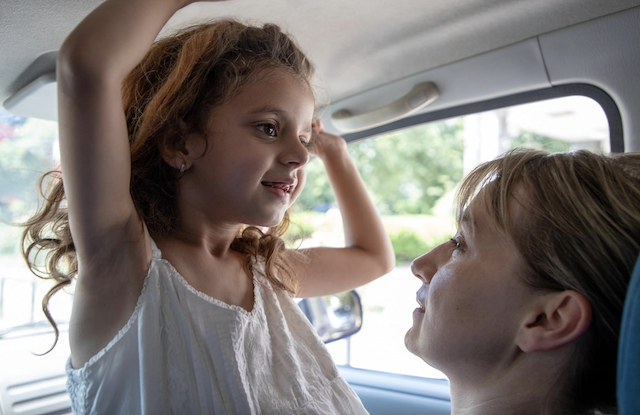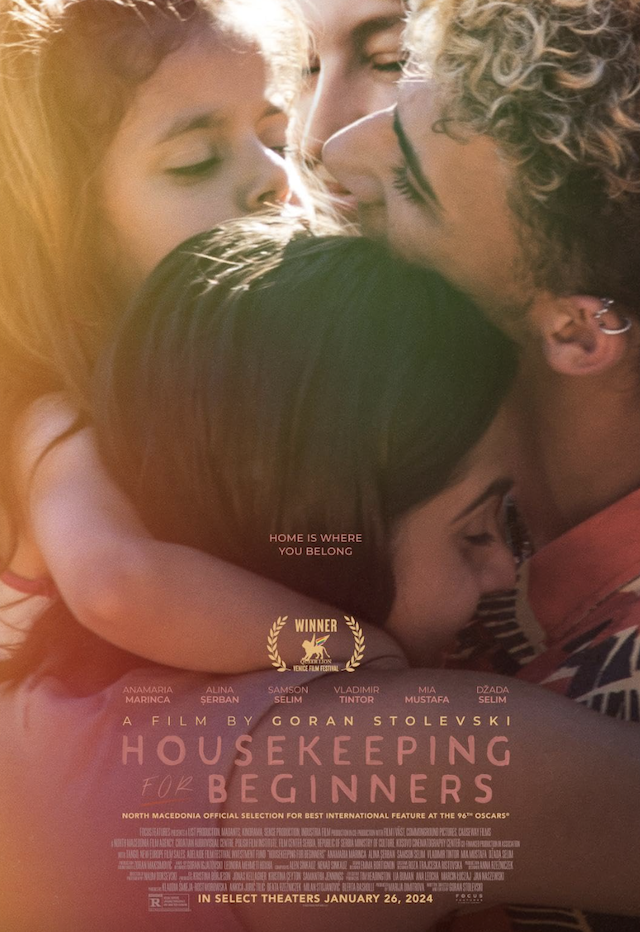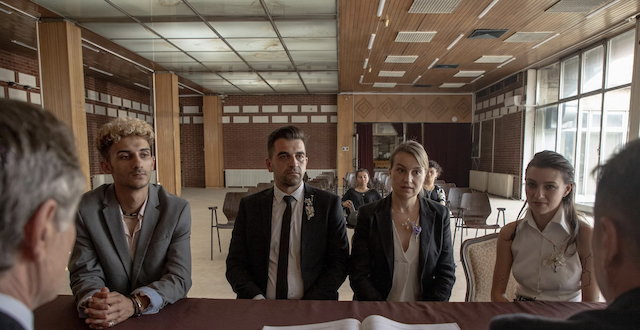
©Photo by Viktor Irvin Ivanov – © 2013 Focus Features
From acclaimed filmmaker Goran Stolevski comes a story exploring the universal truths of family, both the ones we’re born into and the ones we find for ourselves. Dita never wanted to be a mother, but circumstances force her to raise her girlfriend’s two daughters, tiny troublemaker Mia and rebellious teen Vanesa. A battle of wills ensues as the three continue to butt heads and become an unlikely family that must fight to stay together.
Rating: R (Language Throughout|Some Teen Drinking|Sexual Content)
Genre: Drama, Lgbtq+
Original Language: Macedonian
Director: Goran Stolevski
Producer: Marija Dimitrova, Klaudia Smieja, Ankica, Klaudia Śmieja, Ankica Juric-Tilic, Beata Rzezniczek, Milan Stojanovic, Blerta Basholli
Writer: Goran Stolevski
Release Date (Theaters): Limited
Runtime:
Distributor: Focus Features
Production Co: Film i Väst, Kinorama, Common Ground Pictures, Madants, Causeway Films, List Production, SENSE Production, Industria Film

©Courtesy of Focus Features
Exclusive Interview with Director Goran Stolevski
Q: With all the dancing, music and people in the house, how did this engaging concept come about? What was the inspiration for it?
Goran Stolevski: The concept came from a photograph I saw years ago that a friend posted when he first moved to Melbourne in the ‘70s. He lived in a house packed with other gay people. I thought that would be a fun place to set a story in. It was at a time when it was complicated to be queer. I liked this idea of a cocoon, a safe space where you get to live your ordinary life to the fullest with all its pluses and minuses.
It was a shelter from a society that otherwise, wouldn’t have been very conducive to living your life to the fullest. I updated the story to the present day and put it in a country where those dynamics still very much exist. I went from there. I really like films where the story isn’t laid out with expository dialogue. That’s a very TV way of telling stories. I prefer the cinematic way where you just run into a situation, you grasp the right details that infuse the scenes with meaning, and sometimes, like at the end of a scene, what you’ve just witnessed becomes infused with meaning. I took that narrative mode to the extreme. I wanted to see if people would go along with it, or maybe I might turn out foolish. Most people seem to be okay so far.
Q: This character Suada is played by the wonderful Alina Serban. Suada doesn’t take any bullshit, she goes straight to telling her feelings, considering how she might be treated on a daily basis. She really understands what’s going on. She has a great maternal love as well. Talk about creating this character and the dynamic she has with Dita and the family.
Goran Stolevski: My characters start with a particular energy. Essentially, I have a feeling and then that gets connected to a personality. In this case, I think the characters that became Ali and Suada were the first ones that came to me. Essentially they were packed in with the concept. They weren’t specifically romantic to start with.
One of them was inspired by a person I vaguely knew at the time. I don’t even know what Suada was inspired by, probably my personality, the personality developed where I grew up. I’m often drawn to the characters I’m most interested in watching and writing about who are often described as difficult women or unlikable women. I’m never quite sure why they’re difficult or unlikable.
Once it’s explained to me, I get it. In the way I approach the story, the behavior makes sense to me and she just seems real. That’s the feeling I’m looking for when I’m writing, for something to feel real, regardless of how people might respond to this person. There is something charismatic about someone who doesn’t care if they’re liked, but cares about what the truth is and what justice is, not in a way that’s performative, but real, especially in this case, from lived experience. All of this is through words, I articulately try and unpack a process that’s just a creative instinct that happens semi-unconsciously and takes five seconds. T hen I’m like, “Why did I do that?” I’m psychoanalyzing myself in real time with what I’m drawn to.

©Photo by Viktor Irvin Ivanov – © 2023 Focus Features
Q: It seems that music plays a significant part in your film. In your previous one, “Of An Age,” it was exactly the same way. What kind of music did you choose to set the tone of this film?
Goran Stolevski: With both “Of An Age” and “Housekeeping for Beginners,” there were songs that we see on screen that the characters sing and/or dance. Those were in the screenplay and I decided in advance that all the other music ending up playing a role is something that happened in the edit, because I edit my films as well. There’s the script we’ve shot, but to me, it’s also in the editing, so you can still be building more story, meaning, character and energy.
The music comes from that, the feelings that have come together as a result of shooting the film, then build a whole other story. it’s like a building block that you can just keep building on it. when my cast watches “Housekeeping,” they’re always a bit shocked as to how the music is almost its own character, because that was in the screenplay. Actually, in “Housekeeping” specifically, a couple of the singing scenes were improvised.
They weren’t even in the screenplay. I just put them in on the day of filming. It’s a discovery for a lot of the people who were involved in making it as well. Thankfully, I’ve worked with very good producers who can make sure to, you know, get the copyright or organize the recording sessions and all those things.
Thankfully, we were very thrifty in the making of the film so that we could still cover the cost in post-production. The way I approach filmmaking I start with looking for a particular feeling. Often, with the music, I’m looking for something that’s not underlining what’s on screen, but complementing and teasing out layers that otherwise wouldn’t be as tangible. I like to play with counterpoint as well. In “Housekeeping for Beginners,” the main character keeps listening to opera, which was entirely created. In the end, no one here was even on set. It wasn’t a thing I thought of.
I like that idea and what it says about her character. It is like this high class-oriented woman who, partly due to her own background and demographics, has to push her life in this way. The limitations of what being a cultured, educated wealthy person can be, doesn’t mean you’re automatically someone who’s worthy. That’s an example of teasing meaning out of a situation and building on it in the edit.
Q: It’s really devastating to listen to Suada telling two kids — that this is your mom. Talk about creating that emotional dynamic? It’s really powerful considering what’s expected to happen afterwards.
Goran Stolevski: Yeah, that’s the first scene I wrote properly with dialogue and everything; that’s the one that came to me completely. It was always going to be the most difficult to shoot, because obviously a lot of it hinges on a five year old and their reaction to what’s being said. You try directing a five year old — you direct them, they direct you and you have to work around with that. In this case, filming it at the end was quite straightforward.
Since I worked with a great cast and crew who are very connected, I treat those very emotional scenes very seriously. This will sound like a tangent, but usually when you film sex scenes, you only have one take because you’re asking for something that’s uncomfortable for the actors. You close the set and everyone knows and goes in and they’re ready. That’s just protocol. I treat emotional scenes in the same way.
If someone has to cry or experience emotional pain, an actor doesn’t fake these feelings, at least not in my set, they go into a part of their body, they’re re-experiencing trauma. We’re only going to do one or two takes maximum.
We’re not going to be messing around with coverage or lighting a camera. We need to be ready. The crew will have to be out of the way. Every actor will be alert and emotionally generous to their partners and especially in this case, as a child, she was the priority. We shot it very quickly because I didn’t want to keep people in that emotional state, and even the crew watching it became emotional.
There’s only so many times you can do it. Luckily, by this point, we’ve been filming for a while. So everyone was very comfortable around each other and within the story’s world. There’s a little bit of trickery with the editing because we were shielding the little girl from most of this story all throughout the film. It worked out well that day. I’m glad the scene actually has the impact that it really needed to have. It’s the main point of this film.
If you are interested, please leave the comment below!
Check out more of Nobuhiro’s articles.
Here’s the trailer of the film.

